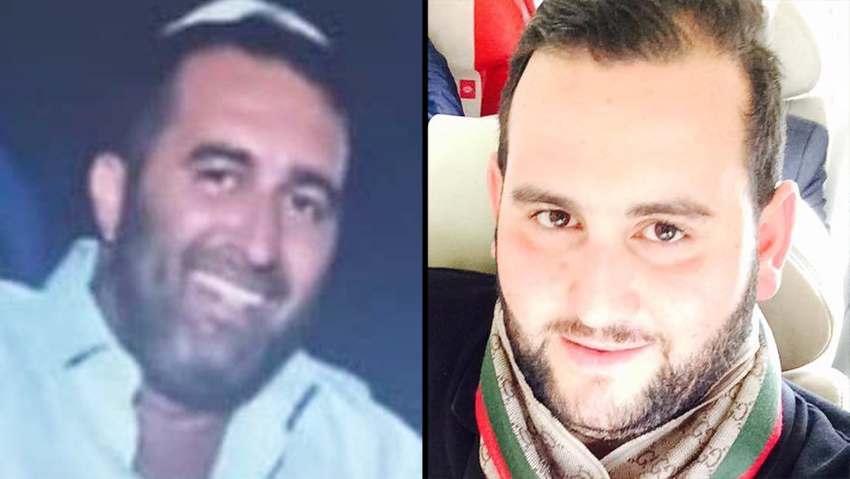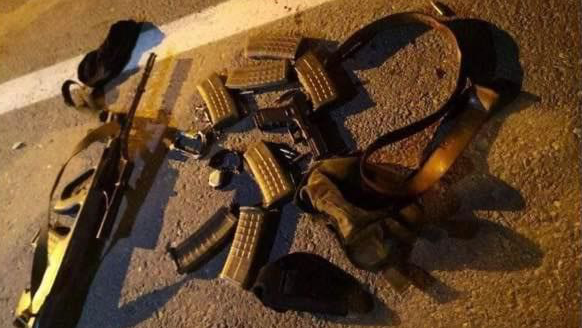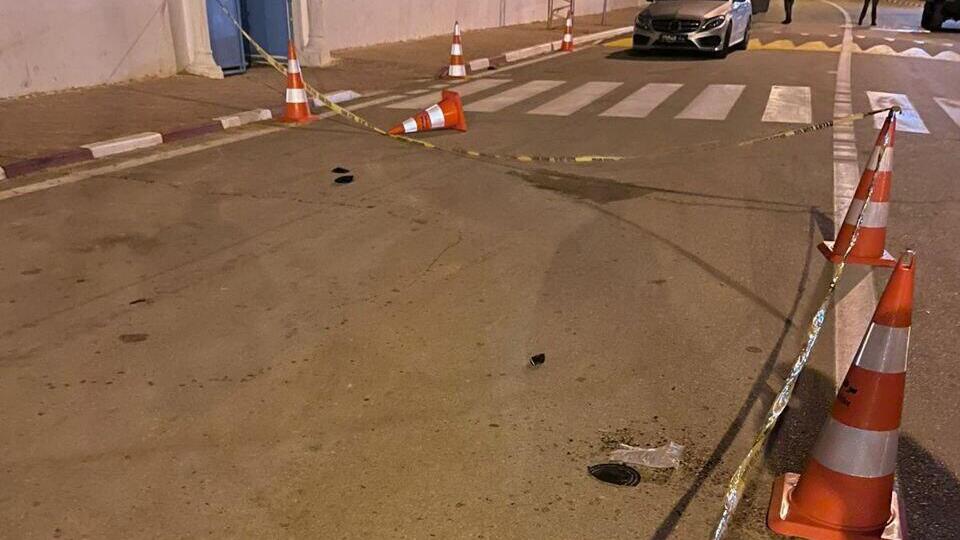The El Ghbriba synagogue after the shooting
The Jewish community in the Tunisian island of Djerba is shaken up following the attack on Tuesday night at the ancient El Ghriba synagogue, in which cousins Ben and Aviel Haddad, who is also an Israeli citizen, were murdered.
"The terrorist was a policeman who traveled over 20 kilometers with a weapon, just to kill Jews," said a community member who wished to remain anonymous. At the community's request, the bodies of the murdered Jews will be flown to Israel for burial.
The terrorist killed three security personnel on-site, he stole one of their weapons and four ammunition magazines before continuing the attack. He murdered Ben and Aviel Haddad in the synagogue's parking lot, before being killed.
"The entire area is filled with police," said a community member. "It is clear that he planned to kill Jews. Now there is a great deal of fear here because there are hundreds of police officers, and we cannot know who will harm us. It is a very difficult situation."
Panic at El Ghriba synagogue in Djerba, Tunisia as gunshots ring outside
Djerba's Jewish community is also distraught over the fact that the authorities have transferred the bodies of the Jews for autopsy in the city of Tunis, which contradicts the religious beliefs of the community. According to them, a Jewish body has never undergone an autopsy in the country, but this time the government refused to prevent it. the community called for international intervention.
Aviel Haddad, whose family resides in Be'er Sheva and Netivot, lived in Djerba. He uploaded a video from the synagogue to his Facebook account before the attack, and his cousin, Miheir Haddad, responded to him shortly after, saying, "Where are you? Everyone is looking for you."
The video Aviel Haddad posted on Facebook before the attack
(Facebook)
In a conversation with Ynet, Miheir said that Aviel opened a jewelry stall at the pilgrimage site and was supposed to attend a football game and return to the synagogue after that.
"He was with three other people - Ben, Zion, and Ilya. On their way to the parking lot, they heard gunshots. Zion and Ilya ran away, while Ben and Aviel went in a different direction and were hit - Ben in the neck, Aviel in the head."
Miheir Haddad received the troubling news during his daughter's birthday party. "My sister, who lives in Tunis, sent me a message saying there are gunshots and that we need to seek help from Israel. We started checking up with families to make sure everyone is okay, and then it turned out that Ben and Aviel Haddad were missing, and they couldn't find them. Zion and Ilya, who were with them, described what happened in the parking lot, and eventually, we saw on the news that two Jews were killed."
According to Miheir, he wasn't surprised by the attack. "I immigrated to Israel five years ago," he said. "Every year when I used to go there for the pilgrimage, I was afraid even of the police. In the end, the scenario I feared became a reality—a terrorist who stole the gun from his commander and managed to bypass security, and the result is known. A week ago, Aviel was with me in Israel. My heart aches. I couldn't sleep all night."
Avi Vazan, a close friend of Aviel Haddad who was also in the synagogue during the attack, recalled the dramatic moments, "We were in the pilgrimage compound with the children. I heard a lot of gunshots one after the other. At first, I thought they were fireworks. I didn't think it was an attack at all." Azan shared.
"It was very frightening. We couldn't find Aviel and Ben. We tried calling them and even sent a message on Facebook, but as the hours passed, I understood that they were no longer alive. They were gold people with good hearts, and they were calm and happy. Aviel and I grew up together; we were one big family in Djerba. It took me time to process this. It's very hard, and many families are considering coming to Israel following this incident."
Tunisia made sure to keep the attack on the down low until the late hours of the night, even while hundreds of Jewish worshippers were under lockdown inside the synagogue, hearing gunshots from outside. Initially, the authorities claimed that the incident was unrelated to the synagogue or its visitors and that it occurred at a nearby Tunisian naval site. According to the initial report, a soldier stole his colleague's weapon and killed him with it, and then he himself was killed after a chase, ending the incident.
However, during the night, the Ministry of Interior released another statement providing further details about the incident that took place there. According to their message, on Tuesday evening, a security officer murdered his coworker, stole his ammunition, and attempted to reach the synagogue. He indiscriminately opened fire toward the security personnel present at the scene, who responded by firing back and killing him, preventing him from entering the premises.
On Wednesday morning, the Tunisian authorities said that two additional security personnel were killed, bringing the total death toll to five—three security personnel and Ben and Aviel Haddad. The report stated that "six security personnel were affected, three of them died, and two other visitors to the compound were killed. Four others who were injured were taken to the hospital for treatment. The authorities have launched an investigation."
Until the early morning hours, the incident was presented in its previous version on the Tunisian news website, failing to mention the number of casualties within the synagogue compound. It was only updated some six hours after the Ministry of Interior's announcement. The Tunisian media barely covered the event, only in a partial and tangential way, sticking to the narrative of the Ministry of Interior's statement. The synagogue and what occurred inside of it were not mentioned, and neither was the fact that the victims were Jewish or that there were Israelis at the scene.
The assessments suggest that an even more severe attack was prevented because the security personnel prevented the shooter from entering the compound, where a massacre of hundreds of Jews there, could have occurred. After the attack, security forces surrounded the synagogue, preventing the worshipers from leaving for hours. They had to wait in fear while hearing gunshots from outside the building and helicopters hovering above.
The Israeli Ministry of Foreign Affairs contacted Israelis who were at the scene and received real-time updates from them about what was happening. Among the people locked inside the synagogue was a former Member of Knesset Yomtob Kalfon, who said, "We heard gunshots from outside the synagogue compound. We don't know exactly what happened there; there are several versions. We prayed the evening prayer while they prohibited us from going outside."
This is not the first time a terrorist attack has been carried out in the past at the El Ghriba synagogue. On April 11, 2002, a truck exploded in front of the synagogue, killing 21 people. The perpetrator, Niser bin Muhammad Nasr Nawar, was driving a truck loaded with gas canisters and explosives, he broke through the security barriers in front of the ancient synagogue and detonated the explosives in the truck. In the attack, three locals, 14 German tourists, and two French tourists were killed, and more than 30 people were injured.






